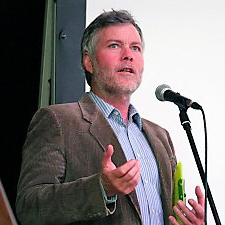One the key insights of Transition is that our local communities are vulnerable to the shocks that will certainly come from extreme weather, volatile energy prices and supply disruption, and global financial meltdown. A full and proper analysis of this vulnerability, in general and in the case of Totnes, is a far bigger project than will fit into a blog post. However, we can easily zero in on a big part of it, which is our dependence on the global economic system itself.
 You know the drill, but in short, the global economic system runs on a simple formula: mass manufacturing + mass distribution + mass media + mass consumption powered by globally mobile finance capital. It’s controlled by large corporations and supported by the most powerful governments in the world, as well as supra governmental organisations, like the WTO. The decisions made in boardrooms and cabinet offices around the world ultimately have more effect on economic life in towns like Totnes than decisions made on the ground, regardless of local concerns or the edicts of powerless local councils.
You know the drill, but in short, the global economic system runs on a simple formula: mass manufacturing + mass distribution + mass media + mass consumption powered by globally mobile finance capital. It’s controlled by large corporations and supported by the most powerful governments in the world, as well as supra governmental organisations, like the WTO. The decisions made in boardrooms and cabinet offices around the world ultimately have more effect on economic life in towns like Totnes than decisions made on the ground, regardless of local concerns or the edicts of powerless local councils.
Their products and services dominate the local high street, here and nearly everywhere else in Britain. In agricultural Devon, Totnesians “import” 73% of our food, if not from abroad than from all corners of the UK. Nearly all building supplies and manufactured goods come from somewhere else, delivered to us by long corporate supply chains. There is no local or regional bank.
 In fact, in many ways, Totnes has become a product itself with brand attributes like “quirky” and “picturesque”, marketed as tourist mecca and second home getaway, gateway to the South Hams. Housing developers salivate for riverfront parcels and wooded acreage that will maximise profit, regardless of local needs and impacts.
In fact, in many ways, Totnes has become a product itself with brand attributes like “quirky” and “picturesque”, marketed as tourist mecca and second home getaway, gateway to the South Hams. Housing developers salivate for riverfront parcels and wooded acreage that will maximise profit, regardless of local needs and impacts.
But while it’s easy to critique this system, it’s another matter to extricate one’s self from it, let alone one’s local economy. The linkages of this modern global economy have evolved over a couple of generations and they are deeply embedded. We’ll never free ourselves entirely from the ties that connect us to the wider economic world, nor would we want such drastic isolation. But if we are to create low-carbon, sustainable, resilient communities, we can only do so to the extent we reduce our dependency on this global system.
The response in Totnes has arisen organically over the past several years with increasing levels of strategic intention. The list of projects is growing, each of which aiming to shift local economic culture in one way or another, nurturing nascent networks and spawning new ones. The Economic Blueprint, the Local Entrepreneur Forum, Food Link, and EcoHome Fair are a few salient projects that will go a long way toward building strong, local economic networks. And from these networks may emerge new enterprises supported, perhaps, by our planned incubator project.
 One of the exciting areas at the moment concerns the local financial system, which includes projects looking to create new relationships of exchange and investment. “Gift culture” comes up in almost any conservation these days where local economics is discussed and is modeled by Dr Bike, Skillshares, our events where we charge “gift” pricing, and other projects that engage, delight and challenge. Cafe Gratitude, an idea on the drawing board may be one such example. On Monday, a convergence of local activists will dive into these issues and what emerges may be more such projects such as a “money group”, a mutual credit system, a gift circle, time bank, etc.
One of the exciting areas at the moment concerns the local financial system, which includes projects looking to create new relationships of exchange and investment. “Gift culture” comes up in almost any conservation these days where local economics is discussed and is modeled by Dr Bike, Skillshares, our events where we charge “gift” pricing, and other projects that engage, delight and challenge. Cafe Gratitude, an idea on the drawing board may be one such example. On Monday, a convergence of local activists will dive into these issues and what emerges may be more such projects such as a “money group”, a mutual credit system, a gift circle, time bank, etc.
Many of these projects are pursued by the REconomy group, but not exclusively, as the Food Group, Building and Housing Group, and even the TTT Arts Network, are involved in projects chipping away at default economic culture and revealing glimpses of something new. What’s also exciting is that some very interesting things along these lines are emerging from households who have taken part in the Transition Streets programme, such as sharing and cooperative ventures.
 There’s much more to all of this than time and space allow here, but it’s beginning to become clear that all this activity is leading toward greater diversity in economic relationships, new networks, and interconnectivity between networks. The monoculture of the Pound Sterling is on its way to becoming merely one medium of exchange among many. The same can be said for the High Street bank loan, as community investment is being redefined with “slow money” financial investment, community share issues, crowd funding, and non-monetary forms of business support. Maybe even the local credit union will find the strength to take advantage new regulations to offer business services, something that’s getting local attention, as well.
There’s much more to all of this than time and space allow here, but it’s beginning to become clear that all this activity is leading toward greater diversity in economic relationships, new networks, and interconnectivity between networks. The monoculture of the Pound Sterling is on its way to becoming merely one medium of exchange among many. The same can be said for the High Street bank loan, as community investment is being redefined with “slow money” financial investment, community share issues, crowd funding, and non-monetary forms of business support. Maybe even the local credit union will find the strength to take advantage new regulations to offer business services, something that’s getting local attention, as well.
All of this activity adds to the resilience of our local economy. It’s necessary but probably not sufficient, as we’ll need to generate more local businesses meeting more local needs. But we’ve taken these first, sure-footed steps, and apparently making good progress. That’s making many Transitioners here feel hopeful and at least a little more secure about the future.
Images: WTO protests, Seattle 1999; postcard view of Totnes; posted needs at last year’s Local Entrepreneur Forum; weaving skill share






